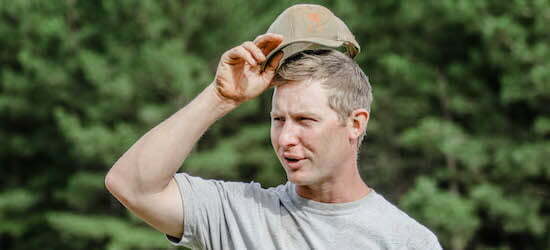ASAP likes to share the stories of people who are contributing to the local food system. This month we’re talking to Aaron Bradley of Colfax Creek Farm to get the inside scoop on raising turkeys.
This is your first year raising turkeys. What was it like?
It was a lot of fun. We’ve raised broilers and laying hens, but turkeys are very unique. They’re smart and curious enough to get into any trouble you give them opportunity to. They are very cool animal. We move our turkeys once a week and it was fun to watch how they would communicate and how social they were as they forage and check out a new area. We have both males and females and the toms will gobble. So it became a thing to that everyone would try to get them to gobble—and everyone is good at that except me. I think I gave the turkeys more entertainment trying to do it.
We had a unique story with these turkeys. We got a batch of broilers before we had the turkeys. In that batch, there was one unique-looking little chick. We raise a Cornish Cross with light features, and there was this one dark chick. It ended up being a guinea. When we moved those broilers out to the pasture, he just took to the turkeys like nothing else. We would try to move him in with the laying hens because of his height, but he wouldn’t have it. So the leader of the turkeys was a guinea. He would be perched on top of the feeder, keeping them in line.
How are your turkeys raised?
Our turkeys are a Broad Breasted White breed. They’re rotated around the pastures and fed formulated ration specific for the quality of turkey with no antibiotics, growth products, or hormones. They just hang in the pasture and do their thing. They forage a lot. With it being our first year having turkeys, we were paying attention to what they were interested in. They would make big rotations around the yard, browsing for bugs, grass, clover, anything they could find. We had planted a bunch of Sorghum-sudangrass for the cattle. The ate a lot of that.
Do you have any tips on preparing a local turkey for Thanksgiving?
I always tell people, we’re really good farmers…we work with some great chefs who could give better advice. We encourage people to brine poultry and have a good instant-read meat thermometer. Conventionally produced turkey will cook a bit faster than one purchased from us. Temperature is most important thing because there are so many different factors to determine the cook time—the oven and size of bird, if you brine it. You have to go by temperature.
Can you share any of your family’s holiday food traditions?
Every Thanksgiving a couple family members always cook a new dish. It’s not a competition, but it’s always interesting to see how it turns out. I usually end up doing a lot of the smoking. The process of that, smoked turkey, is awesome. Other than that, we have a pretty typical tradition. We enjoy each other’s company and try not to each too much food.

